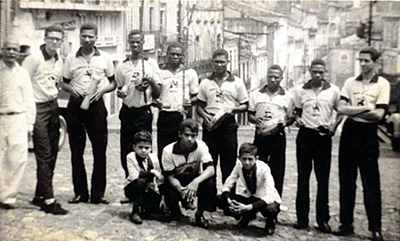
I’ll never forget my first encounter with a Portuguese expression that seemed to make no sense. It happened during my first month in Brazil, when I lived with a host family. One day, I had made plans to meet up with a capoeira friend to train on the beach. My host family went out on some errands, while I waited for my friend – but he never showed up.
Upon arriving, my host mother asked, “So, did you go to the beach?”
“No,” I replied. “My friend didn’t come.”
“Ahhh, he gave cake! (ele deu bolo)” she said.
I was confused. “No, he didn’t give me anything. He didn’t come.”
“He gave cake, he gave cake! It means he didn’t come,” she insisted.
Much, much later I figured out that “he gave cake” means “he stood you up.”
Here are a few more expressions that don’t quite mean exactly what they appear to mean:
Pisar na bola
It literally means: To step on the ball
It actually means: To mess up, to “drop the ball”
I just love the fact that English expresses the concept of messing up with “dropping” the ball, whereas Portuguese expresses it with “stepping on” the ball – each reflective of the country’s national sport.
Encher a cara
It literally means: To fill up your face
It actually means: To get drunk
I think this is a funny and totally appropriate way to express the concept of drunkenness – it evokes mental images of frat boys and beer funnels.
Puxa-saco
It literally means: Sack-puller
It actually means: Yes-man, suck-up, brown-noser
This slightly pornographic-sounding phrase comes from the military, where it used to be common for members of the troop to carry their superior officers’ sacks of clothing. So somebody who fawns over a person in authority is a “sack-puller.”
Mão-de-vaca
It literally means: Cow-hand
It actually means: Stingy
Apparently it’s because a cow’s hoof looks like a closed fist, so somebody who is mão-de-vaca is tightfisted.
Falar pelos cotovelos
It literally means: To talk through your elbows
It actually means: To talk non-stop
It came from the habit that overly talkative people have of touching your elbow to make sure you’re paying attention. This phrase is said to have been coined by Horatio, but I can’t find references to that anywhere on the interwebz.
Pulo do gato
It literally means: Cat’s leap
It actually means: Professional secret
This expression comes from a story! It’s a fable from Minas Gerais:
The jaguar admired the agility of the cat, and asked for some lessons. The cat thought this was a great idea, and began to give classes to the jaguar. Thinking he knew everything, the jaguar resolved to attack the cat and eat it – but the cat simply disappeared. A few days later, when encountering the cat, the jaguar said, “Friend, you didn’t teach me that leap…” The very clever cat responded, “It’s the one that keeps me alive!”
Moral of the story: don’t teach everything to your apprentice, otherwise he’ll try to take your place.
Pra inglês ver
It literally means: For the English to see
It actually means: Just for show
This one’s got some history: Since the declaration of Brazilian independence, England had pressured Brazil to eliminate the save trade – and even patrolled the Brazilian coast with some of its own ships. In 1831, a law was passed that declared freedom for Africans disembarking in Brazil, but it wasn’t taken seriously. However, so as not to anger England, Brazil put some of its own navy in the sea to “hunt down slave ships” – but it was all a farce. So something that is done “for show” is “for the English to see.”
—————————————————————————–
Some of the information in this post is from O Guia dos Curiosos – Lingua Portuguesa, which I highly recommend if you love learning about the Portuguese language!


